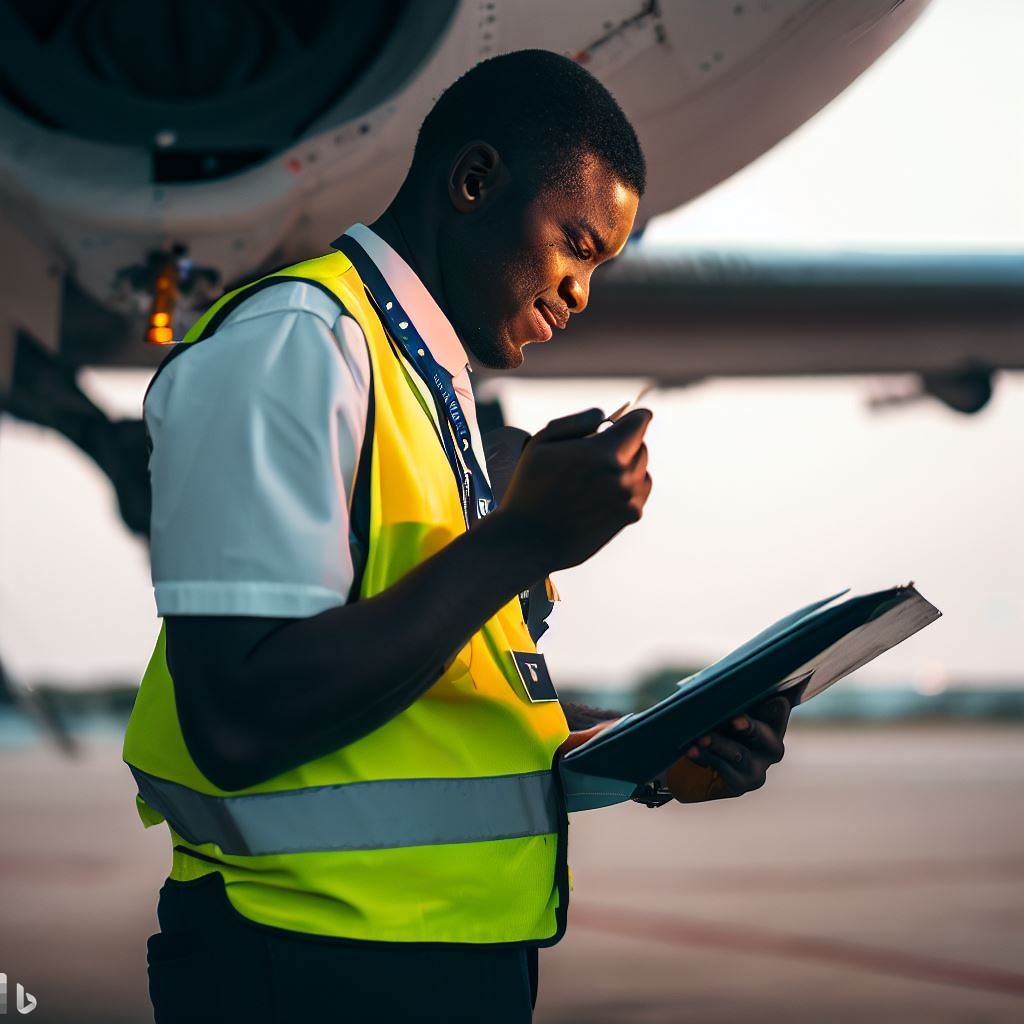Introduction
A flight engineer plays a crucial role in ensuring the safe operation of an aircraft. Routine is vital for a Nigerian flight engineer to effectively carry out their responsibilities.
This blog post will provide an overview of the daily routine and responsibilities of a Nigerian flight engineer.
Brief Explanation of the Role of a Flight Engineer
Flight engineers play a crucial role in ensuring the safe and efficient operation of aircraft.
Mention of the Importance of Routine in the Life of a Nigerian Flight Engineer
- Safety and Compliance: Routine checks ensure aircraft safety and compliance with aviation regulations.
- Efficient Operations: Following routines helps flight engineers maintain smooth and timely flight operations.
- Emergency Preparedness: Regular drills and procedures prepare flight engineers for handling unforeseen situations.
Overview of What the Blog Post Will Cover
This blog chapter offers a glimpse into the daily routine of Nigerian flight engineers. It will explore their responsibilities, challenges, and the significance of adhering to routines to ensure successful flights.
Background information on Nigerian flight engineers
Becoming a flight engineer in Nigeria requires specific qualifications and training, including a Bachelor’s degree in aerospace engineering or a related field and completion of an approved aviation training program by the Nigerian Civil Aviation Authority (NCAA).
The demand for flight engineers is high due to the industry’s continuous growth and development, as they play a crucial role in ensuring safe and efficient aircraft operation.
Currently, there are over 500 flight engineers in Nigeria, reflecting the increasing demand for their expertise. They collaborate closely with pilots and other crew members to monitor and maintain aircraft systems during flights.
However, the aviation industry in Nigeria faces a significant challenge with the underrepresentation of women in technical roles, including flight engineers.
Societal norms, limited educational opportunities, and industry biases contribute to this gender imbalance.
Efforts to promote gender equality through mentorship programs and scholarships aim to empower aspiring female flight engineers and break down stereotypes and biases.
Addressing historical challenges and embracing diversity can lead to a more inclusive workforce, benefiting the industry by harnessing the valuable contributions of women in technical positions.
A diverse aviation workforce will enrich perspectives, enhance innovation, and ensure a prosperous and equitable future for Nigeria’s aviation sector.
Read: Impact of Technology on Banking Jobs in Nigeria
Pre-flight routine
A successful flight begins with a well-executed pre-flight routine. As a Nigerian Flight Engineer, my morning starts early to ensure everything is in order before taking off into the skies.
Waking up early and preparing for the day
I rise with the sun, as the early hours of the day are crucial for a flight engineer.
The first task is to freshen up and prepare myself physically and mentally for the demanding day ahead.
I eat a healthy breakfast to fuel my body and mind, knowing that I need all the energy I can get.
Proper grooming and wearing my uniform instill a sense of professionalism and readiness.
Reviewing flight plans and relevant documents
Before heading to the airport, I carefully review the flight plans that have been prepared.
These plans include information about the route, weather conditions, fuel requirements, and any specific instructions.
I consult with the captain and the co-pilot to ensure we are all on the same page and address any concerns or questions.
Additionally, I go through the relevant documents, such as maintenance logs and technical manuals, to stay updated.
Conducting pre-flight inspections and checks on the aircraft
Once at the aircraft, I begin the crucial task of conducting comprehensive pre-flight inspections.
I meticulously check the exterior, paying attention to the wings, engine, and landing gear, for any signs of damage or issues.
Inside the cockpit, I verify that all the systems are functioning properly and that the instrumentation is accurate.
The safety of the crew and passengers depends on these thorough checks, leaving no room for oversight.
The pre-flight routine is essential as it ensures that all the necessary preparations and checks are completed before takeoff. It sets the foundation for a safe and efficient flight, enabling us to anticipate and address any potential challenges that may arise.
By waking up early, preparing for the day, reviewing flight plans, and conducting pre-flight inspections, I fulfill my responsibilities as a flight engineer and contribute to the overall success of every flight.
Read: Women in Nigeria’s Banking and Finance Industry
Onboard duties and responsibilities
Collaborating with the pilot and co-pilot in the cockpit
The flight engineer works closely with the pilot and co-pilot to ensure a smooth flight.
He collaborates with them in monitoring the aircraft’s performance throughout the flight. Together, they make critical decisions and adjustments to ensure the safety and efficiency of the flight.
The flight engineer assists the pilot and co-pilot in managing the aircraft’s systems and controls. He communicates vital information and updates to the flight crew as needed.
Monitoring and maintaining aircraft systems during flight
- The flight engineer constantly monitors various aircraft systems to ensure they operate optimally.
- He keeps a close eye on the engine performance, fuel consumption, and other vital systems.
- In case of any anomalies or abnormalities, he promptly alerts the pilot and co-pilot.
- He assists in troubleshooting and diagnosing issues to maintain the aircraft’s functionality.
- The flight engineer also conducts regular checks to ensure proper maintenance of the aircraft systems.
Troubleshooting and responding to any emergencies or malfunctions
- The flight engineer plays a crucial role in the event of emergencies or malfunctions during flight.
- He quickly assesses the situation and assists in implementing appropriate emergency procedures.
- His technical knowledge allows him to troubleshoot and address any system malfunctions efficiently.
- The flight engineer works closely with the pilot and co-pilot to safely navigate through challenging situations.
- He remains calm under pressure and provides necessary support to the flight crew until the issue is resolved.
The onboard duties and responsibilities of a Nigerian flight engineer are multifaceted and require a high level of expertise and skill. Collaboration with the pilot and co-pilot in the cockpit is essential to ensure the successful operation of the flight.
By closely monitoring and maintaining the aircraft systems, the flight engineer ensures optimal performance throughout the journey. In times of emergencies or malfunctions, the flight engineer’s quick thinking and problem-solving abilities come to the fore.
By working together with the flight crew, they navigate through challenging situations, prioritizing the safety of everyone onboard.
It is the flight engineer’s dedication and professionalism that contributes to the smooth and safe operation of each flight. Their presence and expertise provide an added layer of security for passengers, assuring them that every aspect of the aircraft is being closely monitored and managed.
Without their critical support, the pilot and co-pilot would face additional challenges and responsibilities, potentially compromising the overall flight experience.
Generally, the role of a flight engineer in Nigeria involves collaborating with the pilot and co-pilot, monitoring and maintaining aircraft systems, and troubleshooting emergencies. With their expertise and technical knowledge, they contribute immensely to the overall safety and efficiency of each flight.
Read: Skills Needed for a Flourishing Finance Career in Nigeria

Meal and rest breaks
Allocation of meal and rest breaks during long-haul flights
Flight engineers operating on long-haul flights have specific regulations regarding meal and rest breaks. These breaks are crucial to ensure their well-being and optimal performance throughout the journey.
During long-haul flights, flight engineers are allocated specific time slots for their meal breaks. These breaks usually last for around 30 minutes to an hour, depending on the airline’s policies.
The allocated time slots are carefully planned to ensure that the flight engineer’s duty doesn’t get compromised.
Rest breaks are also important for flight engineers to recharge and combat fatigue. These breaks are usually around 2-3 hours long and can be taken either in-flight or during layovers.
Airlines strive to create a schedule that allows flight engineers to have sufficient rest and meal breaks during their demanding shifts.
Importance of staying hydrated and nourished during flights
Staying hydrated and nourished is of utmost importance for flight engineers during flights. The nature of their job, which involves long hours of concentration and focus, requires them to maintain optimal physical and mental health.
Due to the dry cabin air and high-altitude environment, the risk of dehydration increases during flights. Flight engineers are encouraged to drink plenty of water and avoid excessive caffeine or alcohol consumption.
Hydration helps in preventing fatigue and maintaining cognitive abilities, ensuring safe and efficient operation of the aircraft.
Proper nutrition is also essential to keep flight engineers energized throughout their shifts. Airlines provide well-balanced meals, catering to various dietary preferences and restrictions.
These meals typically include a combination of proteins, carbohydrates, and fruits or vegetables.
Strategies for maintaining alertness and focus during extended periods of work
Flight engineers need to stay alert and focused during extended periods of work to ensure the safety of the aircraft and its passengers. Here are some strategies they employ:
- Regular exercise: Flight engineers engage in light exercises to stimulate blood circulation and combat fatigue. Simple stretches and walking during breaks help in staying alert and reducing lethargy.
- Power naps: Taking short power naps during rest breaks can help flight engineers rejuvenate and improve their alertness. Napping for around 20-30 minutes can boost cognitive function and enhance overall performance.
- Mental stimulation: Flight engineers challenge their minds by solving puzzles, reading, or engaging in other mentally stimulating activities during breaks. This helps to keep their cognitive abilities sharp and maintain focus.
- Conversation and teamwork: Engaging in conversation with the pilot and other crew members can help flight engineers maintain social interaction, which promotes alertness and mental agility.
- Controlled caffeine intake: Flight engineers regulate their caffeine intake strategically. Consuming moderate amounts of caffeine can provide a temporary energy boost and aid in staying alert.
However, excessive consumption can lead to jitters and disrupt their sleep patterns.
With these strategies in place, flight engineers can effectively maintain their alertness and focus throughout long-haul flights, ensuring the safe and smooth operation of the aircraft.
Read: Essential Networking Tips for Nigerian Bankers
You Might Also Like: The Role of Education in Nigerian Software Engineering
Post-flight routine
Debriefing with the flight crew and management
After landing, the Nigerian flight engineer participates in a debriefing session with the rest of the flight crew and management.
This is done to discuss any issues or concerns that may have arisen during the flight. The engineer provides valuable insights and feedback based on their observations and experiences during the journey.
It is an opportunity to address any technical challenges faced and find solutions for improvement in future flights.
Documenting flight data and submitting reports
Once the debriefing is complete, the flight engineer starts documenting essential flight data. This includes recording any maintenance issues, fuel usage, and other relevant information.
Precise data ensures accurate analysis of the flight’s performance and serves as a reference for future operations.
The engineer then compiles all the required reports and submits them to relevant departments, including maintenance and safety.
Engaging in personal activities and hobbies during downtime
After fulfilling their professional responsibilities, the flight engineer gets some well-deserved downtime.
During this time, they engage in various personal activities and hobbies to relax and recharge. Some engineers may pursue physical activities like exercising or sports to stay fit and maintain their health.
Others may indulge in recreational activities such as reading, listening to music, or spending time with family and friends.
This time also allows them to explore their personal interests and hobbies, which could range from painting to playing musical instruments.
Basically, the post-flight routine of a Nigerian flight engineer involves debriefing, documenting flight data, and enjoying personal activities.
This routine ensures effective communication within the flight crew, helps in analyzing flight performance, and encourages a work-life balance.
Challenges and Rewards of the Job
Discussion of the Physical and Mental Challenges Faced by Flight Engineers
Being a flight engineer in Nigeria comes with its fair share of challenges. The job requires immense physical and mental stamina.
The demanding work hours take a toll on the flight engineer’s sleep schedule and overall health.
Working in high-pressure situations, flight engineers must constantly be alert and make quick decisions.
The physical demands of maintaining and troubleshooting aircraft systems can be physically exhausting.
Adapting to changing weather conditions and operating in different time zones can lead to jet lag and fatigue.
Flight engineers must also possess exceptional problem-solving skills to handle any mid-air emergencies.
The Satisfaction Derived from Overcoming Challenges and Contributing to Safe Flights
Despite the challenges, flight engineers find great satisfaction in their role. The rewards of the job are truly remarkable.
- Knowing that their expertise helps ensure the safety of the passengers and crew is immensely rewarding.
- Overcoming technical issues and successfully troubleshooting aircraft systems provides a sense of accomplishment.
- Flight engineers take pride in contributing to the smooth operation of flights and the timely arrival of passengers.
- Witnessing the positive impact of their work on passengers’ lives fills them with a deep sense of satisfaction.
- Being part of a team that upholds the highest safety standards creates a strong sense of professional achievement.
Sense of Fulfillment and Camaraderie within the Aviation Community
Beyond individual rewards, flight engineers also experience a sense of fulfillment and camaraderie within the aviation community.
- The shared experiences and challenges create a bond among flight engineers, fostering a strong sense of camaraderie.
- Collaborating with pilots, cabin crew, and other aviation professionals forms a tight-knit community.
- Being part of this community allows flight engineers to continuously learn and grow in their profession.
- The mutual respect and shared passion for aviation create a supportive network that enhances job satisfaction.
- The aviation community’s sense of unity and dedication to safety makes flight engineers feel valued and respected.
In a nutshell, a Nigerian flight engineer faces both physical and mental challenges in their day-to-day routine. However, the rewards of overcoming these challenges are immense.
The satisfaction derived from contributing to safe flights and being part of the aviation community makes the job fulfilling. Despite the hardships, flight engineers continue to perform their vital role with passion and dedication.
Conclusion
To all aspiring flight engineers, we encourage you to pursue your passion in aviation and contribute to this amazing industry. The daily routine of Nigerian flight engineers brims with responsibilities and challenges, ensuring safe air travel. We deeply appreciate flight engineers’ dedication and hard work in upholding aviation safety.
To all aspiring flight engineers, we wholeheartedly encourage you to pursue your passion in aviation and actively contribute to this amazing and ever-evolving industry. Your commitment and expertise are essential in shaping the future of air travel, fostering innovation, and ensuring passengers’ well-being. Embrace the opportunities, overcome the obstacles, and let your determination soar.
Nigeria’s aviation sector awaits your valuable contributions, and together, we will continue to elevate the standards of safety and excellence in this dynamic field.




